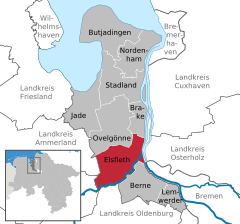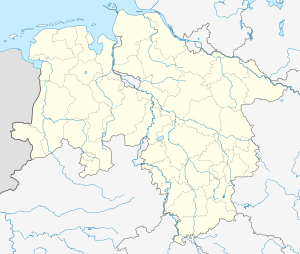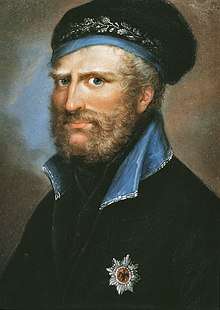Elsfleth
Elsfleth is a town in the district of Wesermarsch, Lower Saxony, Germany. It is situated at the confluence of the Hunte with the Weser, on the left bank of the Weser. It has a school of navigation (university of applied sciences), a harbour and docks.
Elsfleth | |
|---|---|
 Coat of arms | |
Location of Elsfleth within Wesermarsch district   | |
 Elsfleth  Elsfleth | |
| Coordinates: 53°14′N 8°28′E | |
| Country | Germany |
| State | Lower Saxony |
| District | Wesermarsch |
| Government | |
| • Mayor | Brigitte Fuchs |
| Area | |
| • Total | 115.15 km2 (44.46 sq mi) |
| Elevation | 3 m (10 ft) |
| Population (2018-12-31)[1] | |
| • Total | 9,105 |
| • Density | 79/km2 (200/sq mi) |
| Time zone | CET/CEST (UTC+1/+2) |
| Postal codes | 26931 |
| Dialling codes | 04404 |
| Vehicle registration | BRA |
| Website | www.elsfleth.de |
Elsfleth offers many recreational facilities even though it is a small town,. It is an ideal place for families that want to escape big cities and like outdoor activities that are not only limited to tennis and biking. A nearby beach area and sailing club "SWE" contribute to Elsfleth's maritime character. So does the tall ship club Großherzogin Elisabeth amicably called "Lissi". Nearby larger cities are Brake, Nordenham, Oldenburg, and Bremen.
Sons and daughters of the city
- Friedrich Bolte (1860-1940), Director of the Hamburg Navigation School
- Karl Schröder (1890-1966), tax consultant and politician (SPD)
- Erich Zander (1906-1985), jurist, politician (CDU)
- Horst Karsten (born 1936), versatility rider, Olympic medal winner
Connected to Elsfleth

Frederick William, Duke of Brunswick-Wolfenbüttel 1801
- Anthony Günther, Count of Oldenburg (1583-1667) introduced the Elsfleth Weser toll
- Frederick William, Duke of Brunswick-Wolfenbüttel (1771-1815);
- Wilhelm von Freeden (1822-1894), mathematician, natural scientist, oceanographer
- Heinrich Emil Timerding (1873-1945), mathematician, was professor at the sea school in Elsfleth around 1900
- Bernhard Müller (1887-1970), politician (SPD), lived in Elsfleth
| Wikimedia Commons has media related to Elsfleth. |
gollark: Doesn't the petrial one look identical to the nonpetrial one?
gollark: I feel like these might be hard to portray in an emoji.
gollark: <:great_stellated_dodecahedron:793814835992461343> <:small_stellated_dodecahedro:793896625856446464>
gollark: <:great_stellated_dodecahedron:793814835992461343>
gollark: <:octachoron:793811010393866240>
This article is issued from Wikipedia. The text is licensed under Creative Commons - Attribution - Sharealike. Additional terms may apply for the media files.